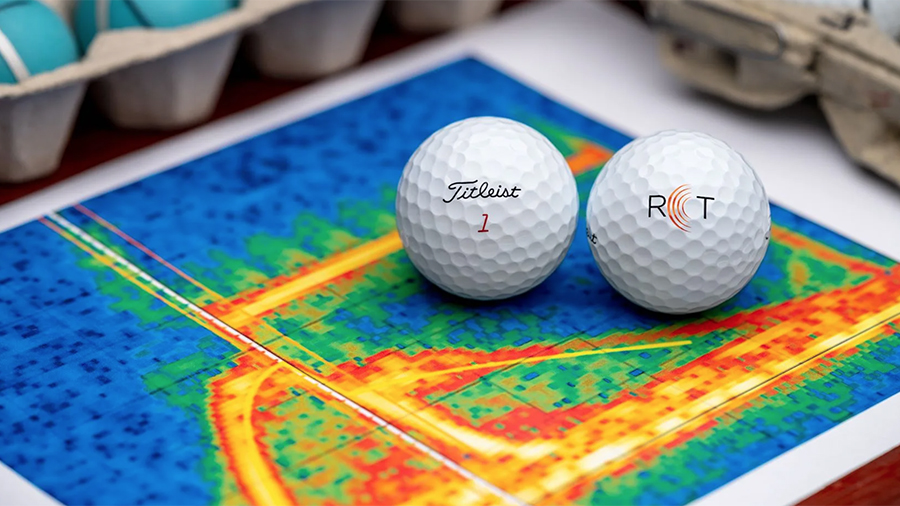Acushnet Holdings Corp.’s earnings and sales soared past Wall Street targets as the parent of the Titleist and FootJoy brands was able to circumvent extensive supply chain challenges to meet continued vibrant demand across golf categories.
Acushnet’s outlook was significantly raised for the year.
“Acushnet continues to build terrific momentum across our businesses as our team successfully navigates the current supply chain environment,” said David Maher, president and CEO, on a conference call with analysts.
Sales in the quarter ended September 30 rose 8.0 percent to $521.6 million and 7 percent on a currency-neutral basis. Wall Street’s consensus estimate had been $416.54 million. On a two-year stack basis, sales were up 25 percent.
“Titleist golf clubs and gear and FootJoy led this growth with clubs and FootJoy each posting double-digit gains,” said Maher. “Golf balls were up almost 40 percent versus 2019 yet down 3 percent versus last year as availability was tight throughout the quarter.”
Adjusted EBITDA of $70.3 million was down 29.1 percent year-over-year, with a decline expected due to higher metal supply chain costs and investments throughout the business. Adjusted EBITDA was up 26.0 percent compared to 2019.
Net income slumped 37.9 percent to $39.3 million, or 52 cents a share, but came in well above Wall Street’s consensus estimate of 13 cents.
Year-to-date net sales of $1,727.4 million were up 45.0 percent year-over-year, ahead 40.9 percent in constant currency and up 31.6 percent compared to 2019. Year-to-date Adjusted EBITDA of $333.3 million grew 80.1 percent year-over-year and 70.4 percent compared to 2019.
Said Maher, “Each of our businesses is in great shape, and strong demand is driving healthy growth while we manage tight availability in just about every product category.”
By business segment, sales of Titleist golf balls were down 1.7 percent to $167.2 million. On a currency-neutral basis, sales were off 2.7 percent in the quarter but grew 36.6 percent year-to-date.
“We are pleased with the performance and momentum of the Titleist golf ball business,” said Maher. The Titleist ball count in use across worldwide tours is 73 percent, more than seven times the nearest competitor.
The new Titleist Pro V1 with Radar Capture Technology (RCT) designed to optimize the indoor user experience with golfers using TrackMan devices, is seeing a strong launch. Maher said, “While not a large volume opportunity, this product offers a good example of how the company’s unwavering commitment to golf ball R&D can enhance the golfer experience and further position Titleist as the golf ball innovation and performance leader.”
As discussed on prior calls, raw material shortages have limited golf ball production levels, and tight availability is expected to continue for the foreseeable future. Like last year, production lines were converted to support new Titleist golf ball models in the first quarter. Said Maher, “As you would expect, the timing of this transition becomes a balancing act as we seek to both satisfy at-once demand while also building inventories to support upcoming launches.”
Titleist golf clubs in the quarter were $135.6 million, up 12.3 percent. On a currency-neutral basis, sales were up 11.5 percent in the quarter and 51.5 percent in the nine months.
The highest growth in clubs is generated in the U.S. and Japan. “The global launch of new T-Series Irons in August was comprehensive and successful, a testament to the good work by our product development and operations teams to advance plan and execute in this dynamic environment,” Maher said.
He continued saying Titleist was the most played driver, hybrid, iron and wedge this past season, with more winners using Titleist equipment than any other brand.
“The Titleist club business is in great shape,” said Maher. “And while the fourth quarter will be down as we comp against last year’s TSI driver launch, we think the business is well-positioned for the future.”
Titleist golf gear sales reached $46.6 in the quarter, up 5.2 percent. Currency-neutral sales were up 4.1 percent in the quarter and 32.9 percent in the nine months. Sell-through of Titleist golf gear’s 2021 line “has been excellent, and while factory shutdowns in Vietnam have impacted availability, we are seeing the situation begin to stabilize as vaccination rates climb.”
FootJoy‘s sales were up 18.9 percent in the quarter to $137.9 million. On a currency-neutral basis, sales were up 17.6 percent in the quarter and 42.0 percent in the nine months. Growth in the quarter was led by the success of key footwear franchises——-Premier, HyperFlex and Traditions. Strength was seen across all regions. The F.J. apparel business is tracking ahead of expectations, led by accelerated growth in the U.S. and Korea and a strong response to seasonal collections.
Maher also said Acushnet is pleased with strong performances and growth from Titleist apparel in Asia and the KJUS golf business in the U.S. and Europe.
By region, sales in the U.S. increased 4.2 percent in the quarter to $282.6 million, primarily driven by an increase of $9.1 million in Titleist golf clubs and an increase of $8.2 million in FootJoy golf wear, partially offset by a decrease of $8.1 million in Titleist golf balls. Sales in the U.S. were up 44.5 percent in the nine months.
Net sales in regions outside the U.S. were up 12.9 percent and ahead 10.5 percent on a constant currency basis. On a currency-neutral basis, the gains were led by Korea, up 20.0 percent to $75.8 million, primarily due to an increase in FootJoy golf wear. Japan’s sales on a currency-neutral basis advanced 17.5 percent to $47.9 million due to an increase in Titleist golf clubs.
EMEA was up 1.1 percent on a currency-neutral basis to $68.9 million, while Rest of World grew 4.5 percent to $46.4 million.
Maher said year-to-date rounds of play have increased in all regions, with the three largest markets of the U.S., Japan and Korea up between 8 and 15 percent through September.
For 2021, Acushnet now expects full-year consolidated net sales to be approximately $2,080 to $2,110 million and adjusted EBITDA to be approximately $305 to $325 million. Previously, guidance called for sales to be approximately $1,930 to $1,990 million and adjusted EBITDA to be approximately $285 to $305 million.
On a constant-currency basis, consolidated net sales are now expected to be in the range of 26.1 percent to 28.0 percent, up from a previous range of 16.8 percent to 20.6 percent.
“Looking forward, we are optimistic about the health of the game and its underlying fundamentals,” said Maher. “Golfer engagement levels are high, and our trade partners are successfully adapting to golf’s evolving ‘new normal.’ Our Titleist, FootJoy and KJUS product development pipelines are in great shape and we look forward to launching a comprehensive range of new products over the next several months. And while we are confident in our team’s ability to manage supply chain complexities proactively, we anticipate that the current environment of raw material shortages disrupted production schedules, longer component lead times and increased freight costs will continue for the foreseeable future. That said, we’re enthused that many of our supply partners are investing in their infrastructures, which will ultimately benefit Acushnet’s supply chain capabilities.”
In the longer term, Maher said accelerated investments in Acushnet’s digital infrastructure over the past year led to the continued expansion of its global B2B and B2C capabilities. He said, “Investments will drive improved service levels, shorter lead times and enhanced user experience for our trade partners and end-use golfers.”
The planned transition to a centralized U.S. distribution center is expected to provide faster and more cost-effective fulfillment, and its ongoing $125 million capital investment in support of golf ball manufacturing, innovation, and customization is expected to better position Titleist for growth in its core category.
Said Maher, “We are confident that Acushnet is structured and well-positioned to capitalize on this vibrant golf market.”
Photo courtesy Titleist, Pro V1 with Radar Capture Technology
















